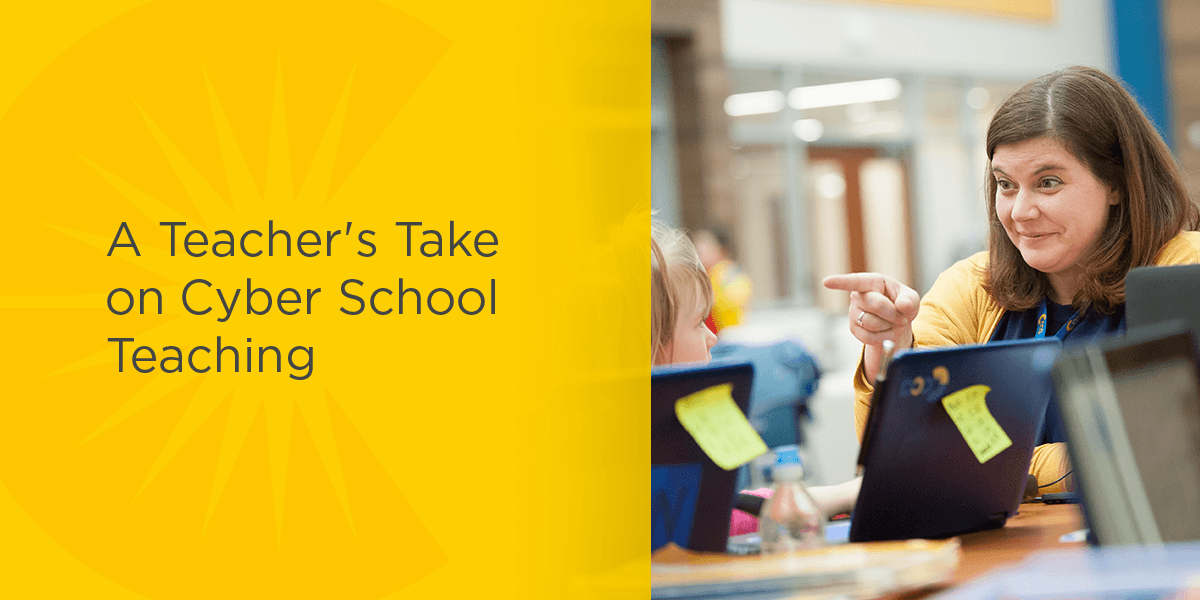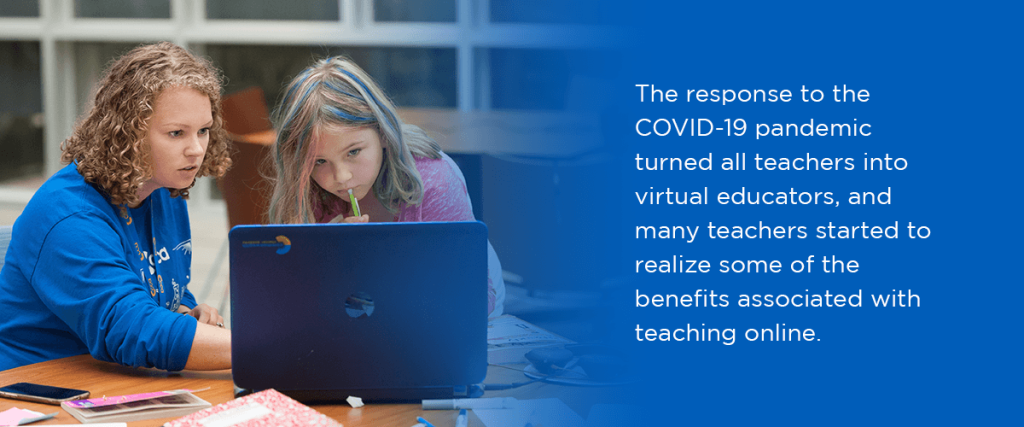Enrollment Now Open for Second Semester. Click Here
Enrollment Now Open for Second Semester. Click Here

Teaching in a cyber school environment is rewarding and fulfilling. At Commonwealth Charter Academy, cyber school teachers spend much of their time working together with students and learning coaches to develop an ideal set of lesson content, field trips, and extracurricular activities.
The role and responsibilities of a cyber school teacher vary from one grade level to the next. Similar to in-person school teachers, a cyber school teacher’s job is to guide students in their educational development and provide support during their academic journey.
If you’re wondering what it’s like to teach virtual school or simply want to know more about the role of a cyber school teacher, there is a plethora of information for you to consider.
A cyber school teacher differs from a traditional teacher in a few ways. Interacting with students is different for a cyber school teacher than it is for traditional teachers. As a virtual school teacher, you’re not teaching students in a face-to-face environment. Instead, your interactions with students happen primarily through digital means and will be both synchronous and asynchronous. Despite the differences, many cyber school teachers find ways to interact with their students and connect with them on a personal level to bring out their best work.
A cyber school teacher engages students in a variety of ways, including:
Many cyber schools offer individualized lesson content for their students. To do this, teachers collaborate with parents and students to develop an ideal curriculum that matches the student’s interests, hobbies, and academic abilities. This also makes the ways cyber school teachers interact with their students more instrumental to their success in the classroom.
Creating lesson content for virtual teachers requires careful planning on several different levels. Cyber school teachers create lesson content for live class meetings as well as develop virtual course content. They are also responsible for curating assignments and assessments to ensure students are meeting curriculum standards.
Since students are learning online, creating lesson content involves producing a variety of supplemental learning materials that ensure a student’s understanding of the required material. Teaching at a cyber school requires a range of skills to craft high-quality, useful learning materials including:
Virtual school teachers are expected to teach the same amount of students and classes as traditional teachers. In some cases, they have fewer students per class, providing a richer, more personalized learning experience for their students.

As digital environments start to play a larger role in our everyday lives, many professions have seen a shift toward working remotely, and teaching is no exception. The response to the COVID-19 pandemic turned all teachers into virtual educators, and many teachers started to realize some of the benefits associated with teaching online. Unlike traditional in-person teachers, cyber school teachers have the benefit of working for cyber schools already set up with the resources and materials they need to successfully teach the required curriculum.
Virtual teachers realize many benefits such as:
These are just a few of the benefits associated with teaching online. Virtual school teachers are also afforded the time and luxury of pursuing their ambitions and goals outside of teaching. There are many extra benefits beyond those listed that are associated with teaching at a cyber school, making it an attractive option for anyone looking to start their career as an educator.
Just as there are many benefits associated with teaching at a cyber school, there are also challenges that come with teaching at cyber schools. In fact, cyber school teachers face some of the same types of challenges as traditional brick-and-mortar teachers.
Depending on where they are teaching, virtual educators face similar challenges as their traditional counterparts, including:
Many of these issues are also associated with teaching in a traditional school, such as a high student-to-teacher ratio and limited say over the materials they’re permitted to use for teaching their students.
If you’re interested in pursuing a career teaching at a cyber school, then there are several different pros and cons you need to consider. As we outlined above, you will have many benefits associated with a career teaching virtual school. Perhaps the important aspect to consider when deciding on a career as a cyber school teacher is the school you work for. Different virtual schools offer different advantages, so you will want to carefully consider the school, its policies, and procedures as these will likely affect your daily routines the most.
Even though virtual teaching takes some getting used to, it is an incredibly rewarding experience. Cyber school students who may struggle in a traditional classroom setting, often thrive in the virtual education world. You’ll have the opportunity to make a big difference in the lives of your students.
If you’re thinking about sending your child to a cyber school, then you should know that they’re receiving a comprehensive education from teachers who are highly qualified to teach in a virtual environment.

At Commonwealth Charter Academy, our teachers are experienced, certified, and trained to teach in a virtual environment. Teaching at a cyber school such as CCA offers educators the benefits associated with teaching online without many of the challenges their traditional school counterparts face on a daily basis.
Our personalized lesson content is developed in a partnership between the teachers, students, and their parents to offer an education that plays to their strengths, goals, and unique interests. We offer a comprehensive learning experience for our students that includes the same advantages as traditional schools such as regular field trips, stimulating elective courses, and organized extracurricular activities and clubs.
If you’re interested in starting a rewarding, fun, and engaging career as a cyber school teacher, then working at CCA is the perfect option. Ready to learn more about CCA’s career opportunities and openings? Feel free to request more information about CCA’s current openings and career opportunities.
Have questions about CCA’s teaching and learning online formats? Contact us today to learn more about the ways CCA puts our educators in a position to succeed and positively impact the future of learning.
Enrollment Now Open for Second Semester. Click Here